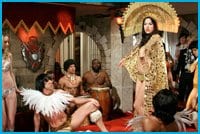You will never see a labour of love quite like Anna Biller’s Viva. The Los Angeles-based filmmaker directed, coproduced, wrote, edited, starred in, designed sets and costumes for and scored her first feature about an average secretary-cum-housewife named Barbi Smith caught up in the sexual revolution of the 1970s.
Biller has managed to recreate 1972 Los Angeles to jaw-dropping perfection, evoking sexploitation directors such as Radley Metzger and Russ Meyer. Viva is a scathing satire of the more illusory aspects of sexual liberation, with promises of female empowerment overshadowed by male narcissism, hedonism and excess. That her critique of past mores is couched in the most fluttery feathered hair, the tightest bell bottoms and the most garish textiles and furnishings — did someone say macramé? — makes the whole film a smart, retro pleasure from start to finish.
As the film begins, Barbi knows her place. She spends her days being groped by sleazy boss Mr Humphrey and her evenings cooking, cleaning and, most importantly, fixing drinks for her successful, blond husband Rick, who looks fresh off a soap opera. Weekends are spent by the pool in carefully choreographed rituals of leisure, naturally with a constant stream of alcohol (one of Biller’s theses is that everyone in the 1970s was drunk all of the time) and meticulously arranged hors d’oeuvres. They spend their time with fun-loving girl-next-door Sheila and her goofy, horndog, failing actor husband Mark, who laughs heartily at his own lame jokes.
After comparing herself to the girls in Playboy, Barbi decides to secretly pursue a modelling career, and when both women find themselves free after their husbands abandon them, they are soon up to their necks in the “adventures” they yearn for. Barbi christens her liberated new self Viva (“which in Italy means ‘to live'”). Barbi ends up in bed with a ridiculously swish hairdresser and his uptight bisexual neighbour (who seduces her in a bizarre sugar-licking scene that is difficult to shake). She stumbles into life as a call-girl at a “singles agency” with such clients as a supposedly sensitive and easygoing hippie named Elmer (who ends up guilting her into having sex) and dating both a black lesbian named Agnes and a tempestuous, pretentious artist named Clyde determined to conquer her at all costs (including drugging her at a costume ball orgy where she is the reigning goddess).
Barbi stumbles through her increasingly traumatic travails as best a suburban naïf can with Biller providing her character with the perfect blank look and a permanent pout. But the swinging is never as fun as it is supposed to be.
The film is very funny. The obsessive historical reenactmentis so relentless, so dead-on and deadpan that its effect is more hypnotic than hilarious. The acting is intentionally wooden, the innuendo intentionally dull-witted, the pace intentionally logy, the situations intentionally far-fetched. Even in the most rollicking nude hippie sing-along has a static quality about it, as if it were a natural history museum diorama or a conceptual art piece. Everything is very glazed in a way. That just makes you empathize with Viva more; she’s trapped in this perfectly but oppressively designed and decorated world where she has no real agency.
The politics Biller resurrects, if not the aesthetics of the period, uncannily resemble our own, where sexual liberation for women still too often comes with the strings of men’s profit and pleasure attached.

 Why you can trust Xtra
Why you can trust Xtra


